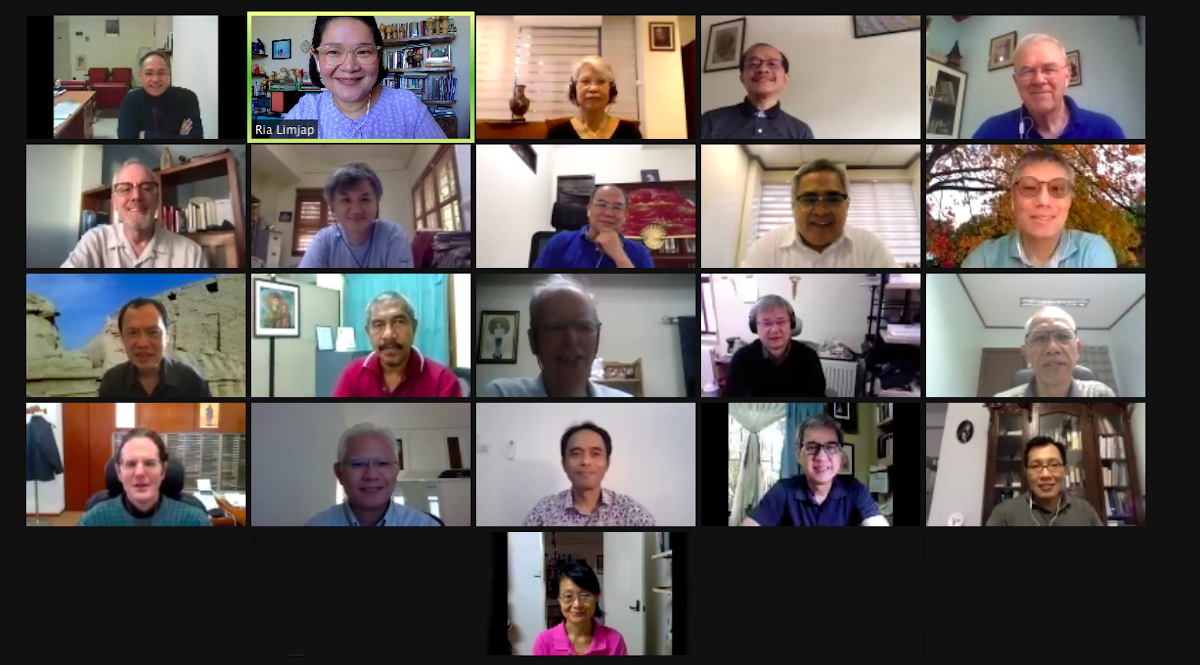 The Jesuit Conference of Asia Pacific (JCAP) major superiors recently met for their bi-annual assembly, the second time it was held online. The meeting welcomed three new major superiors: Fr Quyen Vu SJ from Australia, Fr Edward Quinnan SJ for the Micronesia Community, and Fr Miguel Garaizábal SJ of the Thailand Region. Several topics were discussed, from governance to safeguarding, from the effects of the pandemic to upcoming preparations for the Ignatian Year. The JCAP apostolic plan, which has been refined and revised in order to be relevant to the times we live in, showed the growth of the conference over the years. In such a diverse region–where not one Asian culture exists, but different Asian cultures find ways to co-exist–there is a true need for a unifying road map to guide us forward with God’s mission.
The Jesuit Conference of Asia Pacific (JCAP) major superiors recently met for their bi-annual assembly, the second time it was held online. The meeting welcomed three new major superiors: Fr Quyen Vu SJ from Australia, Fr Edward Quinnan SJ for the Micronesia Community, and Fr Miguel Garaizábal SJ of the Thailand Region. Several topics were discussed, from governance to safeguarding, from the effects of the pandemic to upcoming preparations for the Ignatian Year. The JCAP apostolic plan, which has been refined and revised in order to be relevant to the times we live in, showed the growth of the conference over the years. In such a diverse region–where not one Asian culture exists, but different Asian cultures find ways to co-exist–there is a true need for a unifying road map to guide us forward with God’s mission.
One of the highlights of the assembly was a presentation from the Spanish Jesuit Fr Daniel Villanueva, who is the Executive Vice President of the non-profit organisation Entreculturas-Fe y Alegria. “Originating from faith with an attitude of joy”, Fe y Alegria is an international federation of Popular Education and Social Promotion based on the values of justice, participation, fraternity, respect for diversity, and solidarity, focused on impoverished and excluded populations, in order to contribute to the transformation of society. With roots in liberation theology, the Chilean Jesuit Fr José Maria Vélaz in Caracas, Venezuela founded Fe y Alegria in 1955. Today it encompasses 22 countries mainly in Latin America, Europe, and Africa with 1.5 million students. Bringing Jesuit education to the margins, “where the asphalt ends” as how Fr Villanueva puts it, is an ever-growing need especially in Asia Pacific. The Philippines, Cambodia, and Myanmar have collaborations with Fe y Alegria in the past decade, but other countries like Timor-Leste and Vietnam can certainly strengthen their push for public education.
Another significant presentation was given by Fr James Hanvey SJ from the Secretariat of the Service of Faith. Established in the Jesuit Curia in Rome, it “collaborates with the other Curia Secretariats to animate the service of faith in all apostolic sectors, while supporting the work of Spirituality, with particular attention to the ministry of the Spiritual Exercises”. Fr Hanvey, who specialises in Ignatian Spirituality (also, Catholic Social Teaching and systematic theology), brought to the forefront the importance of the first Universal Apostolic Preference, Showing the way to God through the Spiritual Exercises and discernment. He calls it the foundational one and “absolutely central to our identity”. Fr Hanvey reminds us of the political implications of the Spiritual Exercises, and its relevance in the world today. With a gentle manner but with an invigorating message, Fr Hanvey asks: How do we make Christ more visible? Certainly in spirituality centres, which are “the new frontiers”, but also in schools where there should be a solid programme for Ignatian Spirituality, a “renewed theology” in the universities and formation centres, and in parishes which are key to reaching the faithful.
On the final day of the assembly, the spotlight was on the 40th anniversary of Jesuit Refugee Service (JRS). Fr Thomas Smolich SJ, international director of JRS, joined in from Rome, while director of JRS Asia Pacific (AP) Louie Bacomo participated from Bangkok. Part of the JCAP social ministries network and working closely with others in ecology, indigenous ministry, youth, and migration, JRS is present in eight countries across Asia Pacific. For the 40th anniversary, JRS AP in partnership with JCAP intends to grow 40,000 trees that will help strengthen the cultural rootedness and natural resources of communities in the Philippines, Cambodia, Indonesia, and Thailand. Inspired by Laudato si’ and the Universal Apostolic Preferences, this unique way of marking the anniversary also strengthens communities against forcible displacement through exploitation and aggressive development.
At the end of the five-day meeting–after much listening, sharing, discussion, and prayer–the grace of availability and clarity prayed for at the beginning seemed to pervade throughout. The major superiors of the conference are used to meeting face to face twice a year and confess missing certain elements of camaraderie and fraternity that are hard to feel in an online meeting. And yet despite the challenges and limitations, the assembly was able to practice “synodality in a digital world”.

